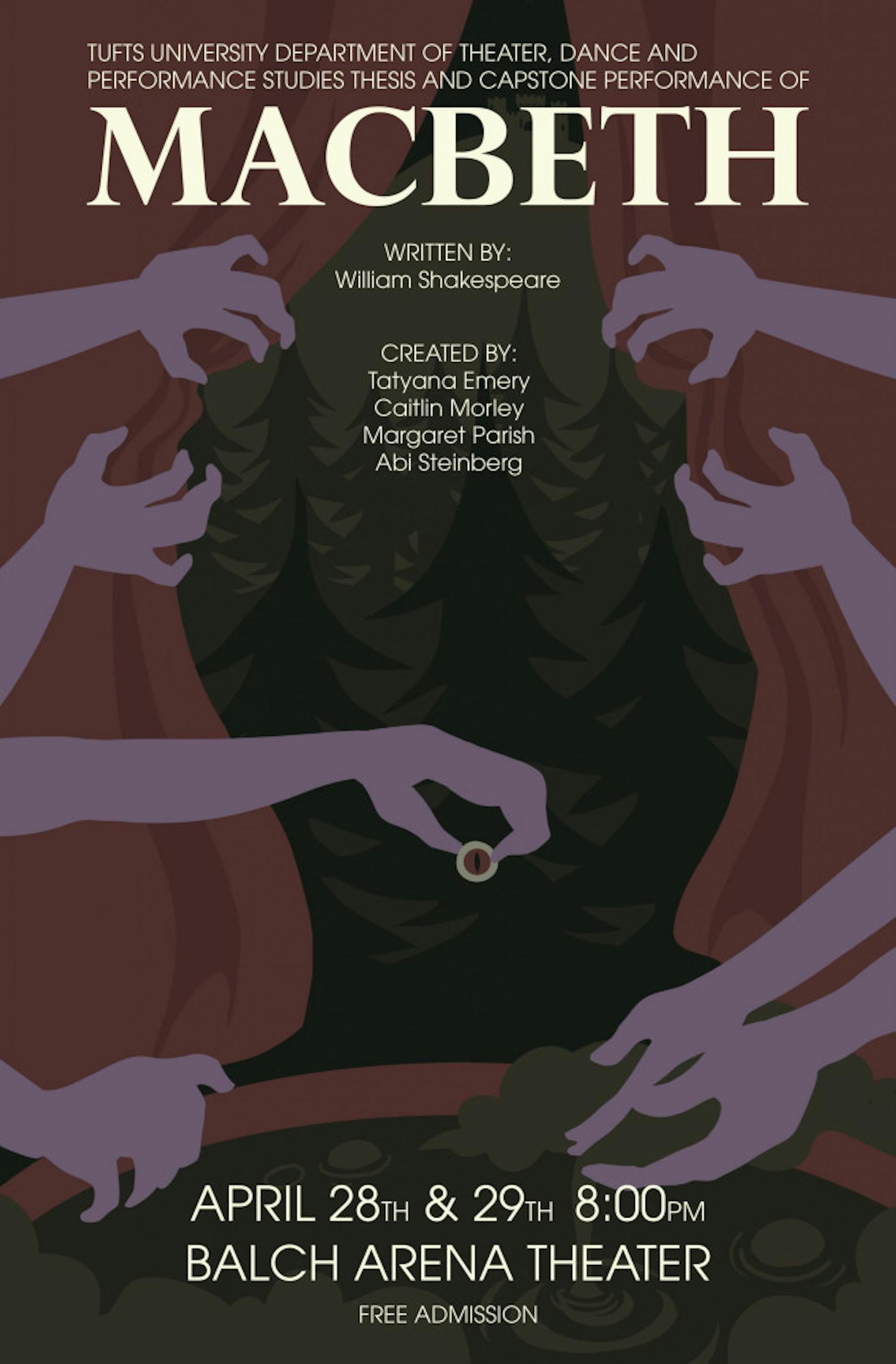Four seniors gathered around their ‘cauldron’ of a show, each adding their own ingredients and flair. The result was an experimental, redefined “Macbeth” (1623), which intentionally diverted from the standard practice of show-making. These seniors are Tatyana Emery, Caitlin Morley, Margaret Parish and Abi Steinberg. Coming together for the completion of Emery’s thesis and Morley’s and Steinberg’s capstone, the group struck down the traditional rehearsal process, eliminating the role of the director and reformulating the power structures within theater.
Central to this production of “Macbeth” is the process itself. By removing the role of the director in the rehearsal space, the group explored new and innovative dramatic methods. Morley considers this to be a form of research, an experiment in an almost entirely new methodology.
“We wanted to create a collaborative rehearsal space that focused on nonhierarchy and took away the role of the director in the room, which sort of made all of us equal collaborators,” Emery said.
By removing hierarchy from the process, each of the four seniors brought their own influence to the production. This brought about the cauldron metaphor, which the group uses to describe their show.
“The premise [of ‘Macbeth’] is that the four witches tell this story, and they are the four of us,” Parish said. “They have been telling the story for hundreds and hundreds of years and tell it over and over again, each time sort of in the hopes that something will change.”
With the spirit of equal contribution and group vision, each of the independent contributors shines. All four of the seniors provide their own unique take, amalgamating into their ‘soup’ of a show, as Emery would describe it. Thus, all four co-creators individually deserve their praise.
Starting with Emery, who is using this production as their thesis, the group gushed over their kindness, talent and stellar impression of Monica Aldama.
“Tatyana is, like, ‘actor extraordinaire,’” Steinberg said. “I feel lucky to get to watch [them] do this, to get to watch [them] live in this moment and feel the words that [they’re] saying.”
“Tatyana has this ability to make you feel like you are the most important person in the world,” Parish said.
Next is Morley, who is using this production for her theater capstone. The other co-creators raved about Morley’s joy and brilliance, whether it be her bonding with Emery in their four-year stint in the Local Bard’s Players or reflections on Morley’s perfume-infused performance of sapphic poetry.
“[Caitlin] is so in love with what she does that it beams out of her,” Emery said. “She’s the kind of person who can walk into a space and be like, ‘Oh, this is really exciting to me,’ and draw other people into that.”
“She is one of those people that you feel lucky to be able to be in their life,” Steinberg said.
Continuing on, Parish is a theater minor who was brought onto the project after its proposal. The other seniors remarked on Parish’s emanating sense of charm and inclusion, ranging from her community creation in the Mayer Campus Center with Steinberg to her top-notch hugs.
“No one has a bad word to say about her because there’s not a bad word that exists next to her name,” Emery said. “It’s impossible, because she just truly embodies love in every sense.”
“Margaret’s the most talented actor I’ve ever met,” Morley said. “I think that Margaret is so honest and earnest in her characters, and she’s such a lovely, giving scene partner. She’ll listen to you.”
Finally, Steinberg is similarly using the production as her senior capstone. The other seniors spoke on Steinberg’s drive and care, referencing her revival of the student theater organization 3Ps.
“Abi is so passionate about not only theater, but making creative opportunities for her and her friends,” Morley said.
“The only thing stopping her from running the world is that nobody has let her do it yet,” Emery said.
When all four of these forces come together, the result is a challenging, empathic, dramatic process. Each of the seniors adds their own insight, and their individual perspective, to create a production unlike anything seen at Tufts and beyond. Central to that mission, of course, is care for each other.
“Our production of ‘Macbeth’ is about the way that care, and care for each other, can disrupt the harm that hierarchy causes,” Steinberg said. This is manifested both in the rehearsal process, with its nonhierarchical structure, and within the narrative itself.
Coming out of their production of “Macbeth,” all four of the seniors expressed individual hopes and goals. These ranged from Steinberg’s reflection on taking the opportunity to experiment while they have it to Parish’s desire to revel in the process itself.
For Morley, it’s about proving something bigger about the nature of theater and discourse.
“I would just want to remember that you can create academic and artistic work that is challenging and rigorous, while prioritizing empathy and care”, Morley said.
For Emery, their hope is actualized in the production itself. Emery wants to show all the moving pieces and to display each individual creator’s influence. In short, they want you to see the ‘cauldron’ for what it is.
“If all of us can come to the cauldron, throw our ingredients in and know that that’s the perfect piece to the puzzle and it would be a completely different show without it, I think we’ve succeeded,” Emery said. “I want to know that we created a space where our community can see us work and be like, ‘They did that.’”
That group spirit, and that creative cohesion of vision, is manifest within all the individual creators. One need look no further than the production itself, and its commentary on hierarchy and care, to see the genuine joy and love that these seniors encapsulate.






